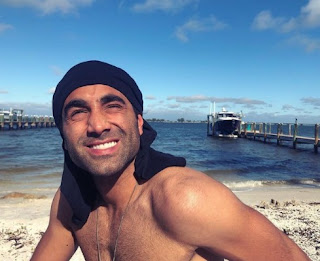Netflix has been pushing Daniel Spellbound at me: a Canadian animated adventure series about a teenage boy who works as a spellcaster, tracking down magical implements for his clients. I've been rejecting it in spite of hunk who pops up when you google creater Matt Fernandes, because because Daniel is partnered with a girl, so it's bound to be hetero-romance all the way down. Also the one-eyed talking pig freaks me out. But in the second season, several male names are mentioned, so I decided to try out the episode where "Jace tries to make good his deal with Daniel." Jace is a boy's name, right?
Scene 1: Two boys, a girl, and the pig is on a ship, fighting glowing sea monsters. Lucy almost falls into a gaping mouth, but she is rescued by Jace, demonic being with purple skin, a sharp face, and one and a half horns. Daniel (Alex Barima), who has black curly hair and wears a red cap, rescues the talking pig.
As more monsters approach, Daniel wishes that they had their teleporting ice cream truck, but it sank. Jace the Demon (Al Mukadam) immediately dives into the ocean -- did he abandon them? No, he went to fetch the ice cream truck! They pile in, Jace demonizes it into working, and they plow through the monsters and fly away.
Scene 2: They materialize on a giant monolith (and almost fall off). "Wait -- this is the Outpost!" Daniel exclaims. "I can't be here!" Jace the Demon touches his arm and explains that he brought them here so Daniel could keep his promise and track his Untrackable (don't know what that is). "But I didn't know it was in the Outpost!"
Back story: Daniel and the Pig snuck into Kel's high-security compound using a Dowser, which is against Tracker Code and got him re-jousted. (Don't know what that means). Bottom line: Kel hates him.
"Don't worry," Jace the Demon says. "You're with me now." So they're canonical boyfriends? "I'll handle Kel."
Scene 3: Jace the Demon and Lucy walking through a room full of glowing cubes on pedestals. Jace summons Kel, a cadaverous humanoid with a stereotyped gay-sophisticated accent. Uh-oh, he knows that they brought Daniel -- there's a video on his cell phone?
"They're with me!" Jace the Demon exclaims. "If you want to keep my family business, you'll leave them alone! I came for my Untrackable Unseeing Eye of the Cyclops."
But first they have to do a job for Kel, to pay him back for Daniel's losses.
Scene 4: A boy-boy couple leaves a pie shop, each with a whole pie, and discuss how deliciously decadent it is. (They each get a whole pie?) They turn purple and float off into the clouds. Huh?
Meanwhile, back at the ice cream truck, the Pig (actually a human under a spell) snits around, criticizing Jace the Demon. Daniel defends him: "He got turned half-demon and stuck in a Soul Box. Naturally he'll be a little off. But he's a nice guy." What do you like most about him, Daniel? His dreamy eyes or his studly physique? "And he's trying to help us."
Pig: "Au contraire, he's trying to help you! And then you'll abandon me and run off and be happy little Trackers together!" Daniel promises to help Pig turn back to human.
Suddenly Cadaverous Kel teleports in, announces that "it's payback time," and zaps Daniel and Pig into a ....bar? Goons surround them, including a half human-half spider guy in a flowered muscle shirt. Daniel stalls by announcing that he has an Untrackable...well, Jace has it. They all laugh. "Dude, Jace is dead!" He spins the Wheel of Punishment to see what will happen to the heroes.
Scene 5: Lucy enters the pie shop from Scene #4 and asks the elderly lady behind the counter for some Witching Silver: an essential ingredient in magic food and astral projection. So the customers project their spirits to the pie shop? Why not just call for delivery? But it's for witches only. "I just need it to help find the Sceptre of the Primus!" Lucy explains. So she needs silver to find the scepter to give to Kel so he'll give Jace the Demon his Cyclops Eye. Are you taking notes?
The elderly lady closes the shop and orders her baker-goons to attack Lucy! She could have just said no.
Back at the bar, Daniel is forced to spin the Wheel of Punishment. It lands on Tickle Pit: "A merciless death trap that no one has survived."
Daniel and Pig are tossed in, and one of the goons accidentally falls in. They are strapped into theater seats. An androgynous clown performs. Goon starts laughing, and the crown rushes up, turns monstrous, and eats his soul. Daniel and Pig try to avoid laughing.
I'm out of space, so I'll stop the scene by scene there. Besides, you really need to watch this show from the beginning to understand the complex mythology. But after Jace comes to the rescue, he and Daniel have a hand-on-shoulder moment, and Pig storms out in a jealous rage.
I doubt that Daniel is canonically gay, but he and Jace have a definite subtext. At least in this episode.
Spoiler alert:
Jace turns evil later on, and the two and their teams have a Final Confrontation. It was nice while it lasted.





















